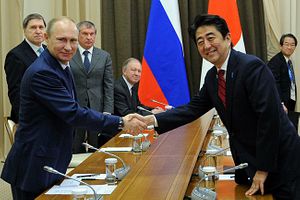Russian President Vladimir Putin’s visit to Japan has been postponed indefinitely due to Russia’s uncompromising stance over a long-running territorial dispute involving the Kuril islands, The Asahi Shimbun reports.
According to unnamed Japanese government sources, the visit would be “difficult to realize” given unbridgeable differences during bilateral negotiations at the vice foreign minister level, which took place on October 8 in Moscow.
The disputed Northern territories–known in Japanese as the Shikotan, Kunashiri, Etorofu and the Habomai islets–and located in the Sea of Okhotsk in the Northwest Pacific, were seized by the Soviet Union in 1945. By 1949 the Russians had expelled all 17,000 Japanese residents of the islands.
Under the 1951 San Francisco Peace Treaty, Tokyo renounced “all right, title and claim to the Kuril Islands,” however, Moscow never signed the peace treaty and Tokyo refused to concede that the four disputed islands where in fact part of the Kuril chain.
As I reported previously, Japan has also repeatedly rejected a Russian offer to settle the dispute with the return of the two smallest territories of the Habomai chain and Shikotan since they only constitute 7 percent of the land in question. The conflict is further fueled by potential offshore reserves of oil and gas, as well as rich fishing grounds.
Hopes of a resolution of the dispute went briefly up during this year’s United Nations General Assembly (UNGA) in September in New York where Vladimir Putin met with his Japanese counterpart Prime Minister Shinzo Abe, after which it was announced that Putin had accepted an invitation from Abe to visit Japan (See: “Putin To Visit Tokyo as Japan, Russia Restart Peace Talks”).
However, as I noted in a piece back in July (See: “How Russia Tries to Intimidate Japan”), chances for a quick resolution of the conflict were slim all along, particularly after Russia announced plans to invest in new military and civilian infrastructure projects on the Kuril islands.
In addition, Russian Prime Minister Dmitry Medvedev’s announcement that he planned to visit the islands sparked further controversy. “Visits to the islands by the Russian prime minister and ministers are of course something we cannot accept. But we need to resolve the islands issue first because that is the source of all of the problems we are having now,” stated an unnamed Japanese government official in an interview with The Guardian.
One of the principle points of disagreement is the scope of any future Russia-Japan negotiations: Russia has repeatedly insisted on decoupling negotiations over a peace treaty from the territorial disputes over the Northern territories, while Japan insists that a peace treaty without resolving the territorial issues is impossible.
Shinzo Abe and Vladimir Putin are slated to meet again during the G20 summit held in Turkey from November 15-16 and the APEC summit scheduled for November 18-19 in Manila. Perhaps a preliminary agreement on an agenda of any future negotiations could be agreed to then.

































